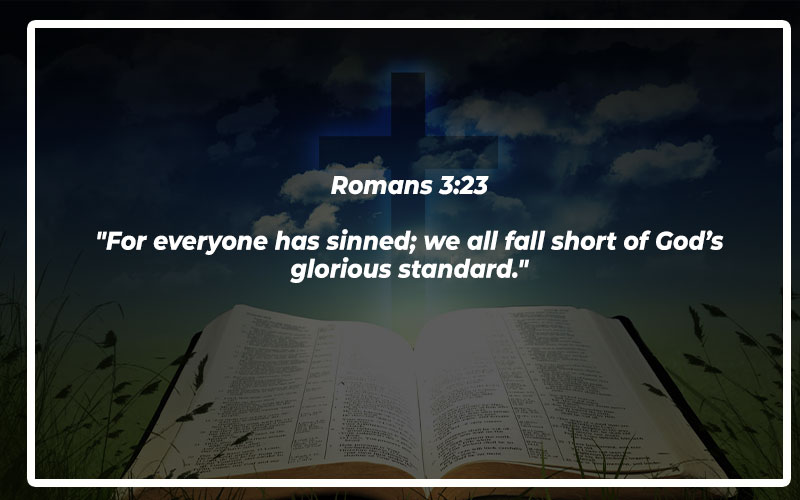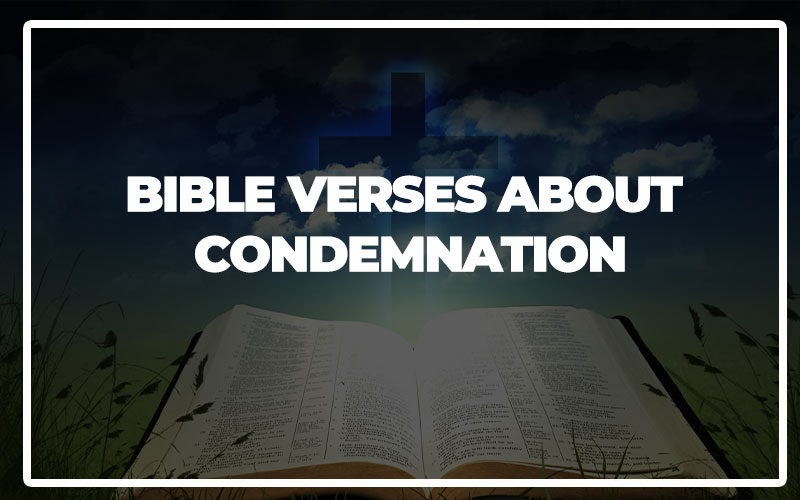Condemnation is a theme that runs through the Bible, emphasizing the consequences of sin and the ultimate need for salvation. However, the Scriptures also reveal God’s heart for redemption, offering freedom from condemnation through faith in Christ. Below are insights into condemnation, its implications, and the hope we have in God’s mercy.
Also Read: Bible Verses About Conscience
Condemnation and Sin
Condemnation often stems from sin, separating us from the love and presence of God. The Bible speaks of the consequences of sin and how it brings about divine judgment. However, it also highlights God’s provision to rescue us from this state through Jesus Christ.
Romans 3:23
“For everyone has sinned; we all fall short of God’s glorious standard.”

This verse emphasizes the universality of sin, reminding us that no one can meet God’s holy standard on their own. Sin leads to condemnation, and it is only through acknowledging our fallen nature that we can seek God’s mercy and forgiveness.
Galatians 3:22
“But the Scriptures declare that we are all prisoners of sin, so we receive God’s promise of freedom only by believing in Jesus Christ.”
The condemnation of sin holds everyone captive. However, this verse brings hope by showing that faith in Christ is the key to escaping the prison of condemnation and receiving God’s promises of freedom and life.
John 3:19
“And the judgment is based on this fact: God’s light came into the world, but people loved the darkness more than the light, for their actions were evil.”
This verse explains that condemnation comes because of humanity’s choice to reject the light of Christ and embrace evil deeds. It highlights the heart of condemnation: when we turn away from God, we remain under judgment.
Romans 6:23
“For the wages of sin is death, but the free gift of God is eternal life through Christ Jesus our Lord.”
The wages of sin are dire, resulting in condemnation and death. However, this verse points us toward God’s incredible grace, which offers eternal life through Jesus. This verse bridges the gap between condemnation and salvation.
Isaiah 59:2
“It’s your sins that have cut you off from God. Because of your sins, he has turned away and will not listen anymore.”
Condemnation creates a separation between humanity and God. Sin forms a barrier that only the grace of God can remove. Isaiah’s words highlight the seriousness of sin, but they also imply the need for repentance and reconciliation with God.
Condemnation and Salvation
Though sin brings condemnation, the Bible also speaks of God’s provision for salvation. Through Christ, believers are offered a way out of condemnation and into a new life of righteousness.
John 3:17
“God sent his Son into the world not to judge the world, but to save the world through him.”
God’s desire is not to condemn, but to save. This verse encapsulates the heart of the Gospel: Jesus Christ came to bring salvation, not judgment, offering hope to all who believe. While condemnation exists, Christ provides the path to escape it.
Romans 8:1
“So now there is no condemnation for those who belong to Christ Jesus.”
This is one of the most powerful assurances in the Bible. In Christ, the believer is freed from condemnation. It emphasizes the transformation that happens when we are in Christ: we are no longer subject to judgment but are justified by His sacrifice.
2 Corinthians 5:21
“For God made Christ, who never sinned, to be the offering for our sin, so that we could be made right with God through Christ.”
Jesus took upon Himself the condemnation meant for us. This verse explains the exchange that happened on the cross: Christ bore our sin so that we could be declared righteous before God. His sacrifice frees us from the condemnation that we deserved.
Colossians 1:13-14
“For he has rescued us from the kingdom of darkness and transferred us into the Kingdom of his dear Son, who purchased our freedom and forgave our sins.”
Condemnation belongs to the kingdom of darkness, but through Christ, we are rescued and brought into the Kingdom of God. This verse speaks of the redemption and forgiveness that is available in Jesus, releasing us from the bondage of condemnation.
John 5:24
“I tell you the truth, those who listen to my message and believe in God who sent me have eternal life. They will never be condemned for their sins, but they have already passed from death into life.”
Jesus assures us that those who believe in Him will never face condemnation. This verse is a promise of eternal security, emphasizing that faith in Christ transfers the believer from death to life, from judgment to grace.
Condemnation and Judgment
In the Bible, condemnation is often linked with judgment. God’s righteous judgment is pronounced upon sin and wickedness, but the Scriptures also reveal a path to avoid this judgment through repentance and faith.
Revelation 20:12
“I saw the dead, both great and small, standing before God’s throne. And the books were opened, including the Book of Life. And the dead were judged according to what they had done, as recorded in the books.”
This verse paints a vivid picture of the final judgment, where everyone will be held accountable for their actions. Condemnation awaits those whose names are not written in the Book of Life, but believers can have confidence that through Christ, they are spared from this fate.
Matthew 12:36
“And I tell you this, you must give an account on judgment day for every idle word you speak.”
Jesus warns that even our words can bring condemnation. This verse calls believers to live a life of integrity and self-control, knowing that every word will be brought into judgment. It reminds us that our words have the power to bring either life or condemnation.
Hebrews 9:27
“And just as each person is destined to die once and after that comes judgment.”
Condemnation is closely tied to the reality of judgment after death. This verse serves as a reminder of the certainty of judgment, urging us to live righteously and be prepared for that day. However, through Christ, we can face judgment with confidence.
John 12:48
“But all who reject me and my message will be judged on the day of judgment by the truth I have spoken.”
Rejecting Christ leads to condemnation. This verse underscores the serious consequences of turning away from Jesus. His message of salvation is the only way to escape judgment, and those who refuse it will face condemnation based on the truth they rejected.
2 Thessalonians 1:8
“In flaming fire, bringing judgment on those who don’t know God and on those who refuse to obey the Good News of our Lord Jesus.”
This verse vividly describes the judgment that will come upon those who refuse to accept the Gospel. Condemnation is the outcome for those who reject God’s offer of salvation, and this verse serves as a powerful call to respond to the message of Christ.
Also Read: Bible Verses About Standing Up for What Is Right
Condemnation and the Law
The Law in the Old Testament reveals God’s righteous standards, and failure to adhere to these laws brings condemnation. However, the New Testament explains how Christ fulfilled the Law, freeing believers from its condemning power.
Romans 7:10
“And I died. So I discovered that the law’s commands, which were supposed to bring life, brought spiritual death instead.”
Paul speaks of the law’s role in bringing about condemnation. While the law was given to promote life, sin took advantage of it, leading to death instead. The law reveals sin but also shows our need for a Savior to rescue us from its consequences.
Galatians 3:10
“But those who depend on the law to make them right with God are under his curse, for the Scriptures say, ‘Cursed is everyone who does not observe and obey all the commands that are written in God’s Book of the Law.'”
The law brings condemnation because no one can fully keep it. This verse emphasizes that relying on the law for righteousness results in a curse. Only through faith in Christ can we escape this condemnation and receive the blessing of God’s grace.
Romans 7:6
“But now we have been released from the law, for we died to it and are no longer captive to its power. Now we can serve God, not in the old way of obeying the letter of the law, but in the new way of living in the Spirit.”
This verse proclaims the freedom believers have from the condemnation of the law. Through Christ, we are no longer bound to the law’s requirements but are led by the Spirit. This new life in the Spirit allows us to serve God with joy, free from condemnation.
James 2:10
“For the person who keeps all of the laws except one is as guilty as a person who has broken all of God’s laws.”
This verse highlights the impossibility of perfectly keeping the law. Even if someone keeps all but one law, they are still guilty of breaking the whole law. This underscores the fact that without grace, we are all condemned by the law’s standards.
Romans 8:3
“The law of Moses was unable to save us because of the weakness of our sinful nature. So God did what the law could not do. He sent his own Son in a body like the bodies we sinners have. And in that body God declared an end to sin’s control over us by giving his Son as a sacrifice for our sins.”
Paul explains that the law, though good, could not save us due to human weakness. Condemnation under the law was inevitable, but God provided a solution through Jesus Christ. His sacrifice fulfilled the law, putting an end to condemnation for those who believe in Him.
Condemnation and Freedom in Christ
Through Christ, believers are liberated from condemnation. The Gospel is clear that in Jesus, we are no longer slaves to sin and judgment but are freed to live a life of righteousness and peace.
John 8:36
“So if the Son sets you free, you are truly free.”

Freedom from condemnation is found in Jesus. This verse affirms the absolute freedom that Christ provides to those who follow Him. No longer bound by sin or the consequences of the law, believers can walk in the liberty that comes through Christ’s sacrifice.
Galatians 5:1
“So Christ has truly set us free. Now make sure that you stay free, and don’t get tied up again in slavery to the law.”
Paul urges believers to remain in the freedom Christ has purchased for them. Though the law condemns, Christ has set us free, and we are called to live in that freedom without returning to the bondage of legalism or sin. Our liberty is sustained through a relationship with Him.
Romans 8:2
“And because you belong to him, the power of the life-giving Spirit has freed you from the power of sin that leads to death.”
This verse declares the power of the Holy Spirit in the life of the believer. In Christ, the law of sin and death no longer has authority over us. The Spirit gives life and breaks the chains of condemnation, empowering us to live in righteousness and victory.
2 Corinthians 3:17
“For the Lord is the Spirit, and wherever the Spirit of the Lord is, there is freedom.”
True freedom from condemnation comes through the Spirit of the Lord. This verse reminds us that the presence of God brings liberty. In the Spirit, believers are no longer under the weight of condemnation but are free to experience God’s grace and peace in every area of life.
Colossians 2:13-14
“You were dead because of your sins and because your sinful nature was not yet cut away. Then God made you alive with Christ, for he forgave all our sins. He canceled the record of the charges against us and took it away by nailing it to the cross.”
This powerful verse shows how Christ’s work on the cross has erased the condemnation that once stood against us. Our sins and failures are no longer held against us because Jesus has paid the full price. In Him, we find complete forgiveness and freedom from all condemnation.
Condemnation and Grace
Grace is the antidote to condemnation. While sin and the law bring condemnation, God’s grace through Jesus Christ offers forgiveness and righteousness, enabling us to live in freedom and peace with God.
Ephesians 2:8-9
“God saved you by his grace when you believed. And you can’t take credit for this; it is a gift from God. Salvation is not a reward for the good things we have done, so none of us can boast about it.”
Salvation comes through grace, not by our efforts. This verse reminds us that God’s grace is the only way to escape condemnation. We cannot earn our way out of judgment; it is purely a gift that comes through faith in Christ.
Titus 3:5
“He saved us, not because of the righteous things we had done, but because of his mercy. He washed away our sins, giving us a new birth and new life through the Holy Spirit.”
Grace saves us from condemnation. This verse emphasizes that salvation is a result of God’s mercy, not our good works. By His grace, we are cleansed from sin and given a new life in the Holy Spirit, free from the condemnation that once enslaved us.
Romans 5:20-21
“God’s law was given so that all people could see how sinful they were. But as people sinned more and more, God’s wonderful grace became more abundant. So just as sin ruled over all people and brought them to death, now God’s wonderful grace rules instead, giving us right standing with God and resulting in eternal life through Jesus Christ our Lord.”
Though sin leads to condemnation, God’s grace is greater. This verse contrasts the reign of sin with the reign of grace, showing that through Christ, grace now rules. God’s grace overcomes the condemnation that sin brings, leading us to eternal life.
2 Corinthians 12:9
“Each time he said, ‘My grace is all you need. My power works best in weakness.’ So now I am glad to boast about my weaknesses, so that the power of Christ can work through me.”
Grace is sufficient to overcome condemnation. This verse reminds us that even in our weaknesses, God’s grace is enough. His power shines through our limitations, freeing us from the condemnation of failure and allowing Christ’s strength to be perfected in us.
Romans 11:6
“And since it is through God’s kindness, then it is not by their good works. For in that case, God’s grace would not be what it really is—free and undeserved.”
This verse highlights the nature of grace: it is free and undeserved. We cannot escape condemnation through our own works, but only through God’s kindness and favor. Grace, not works, brings us into right standing with God and delivers us from judgment.
Also Read: Bible Verses About Staying Positive
What Does the Bible Say About Condemnation
In simple words, condemnation means to judge someone as guilty and deserving punishment. The Bible teaches us that all of us, as human beings, have sinned and done wrong things in the eyes of God. Because of this, we deserve condemnation. But the good news is that God, in His great love, does not want us to stay condemned.
The Bible tells us that God sent His Son, Jesus, to save us from this condemnation. Jesus took the punishment we deserve by dying on the cross. Through His sacrifice, anyone who believes in Him can be saved from condemnation. This means that God no longer sees us as guilty but as forgiven and free.
However, there is a warning too. Those who choose not to believe in Jesus and reject God’s offer of salvation remain under condemnation. They face judgment because they have not accepted the only way to be saved.
The Bible also teaches us not to judge or condemn others. As followers of Jesus, we are called to show love, mercy, and forgiveness to others, just as God has shown to us. Instead of pointing fingers and declaring others guilty, we are encouraged to help one another and lead people to the truth with kindness and compassion.
In short, the Bible tells us that while all people are deserving of condemnation because of sin, God’s love offers a way out through Jesus. By accepting His gift of forgiveness, we are free from the fear of judgment. As believers, we should live with thankfulness and extend grace to others, avoiding condemnation.

